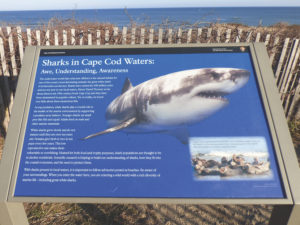WELLFLEET — A familiar foe still lurks in the summer waters, but the unfamiliar foe floating in the air may be distracting from it.
With Covid-19 keeping beachgoers vigilant about their on-beach distancing, local observers worry that shark safety awareness may be suffering.
“I am definitely more scared of the virus,” said Amy White at Newcomb Hollow Beach, who was visiting Wellfleet from Tennessee with her family in early August.
Covid-19, she noted, could be contracted from anybody. “But you have to swim pretty far out for sharks,” she said, “and even then it’s unlikely you will get bit.”
Shark attacks are rare. But Wellfleet has sunk resources into shark-safety equipment and training after the town saw Massachusetts’s first fatal shark attack since 1936 when Arthur Medici was killed at Newcomb Hollow in September 2018. He was only about 40 yards from shore, according to a CBS News report.
The town purchased a $30,000 Polaris Ranger XP buggy, designed to reach bite victims on the beach quicker, and get them to an ambulance. Wellfleet also upgraded its lifeguard towers and installed Stop the Bleed kits at all oceanside beaches.
The new gadgets sent a clear message about shark safety, which people are remembering, according to Beach Administrator Suzanne Grout Thomas.

Beach closings are not uncommon now, with shark sightings as often as three times a day in August, according to Grout Thomas.
“People have been very compliant with our lifeguards when we need to get people out of the water,” she said. “People are following the lead from our work last summer.”
Charlie Arthur, an Orleans resident who frequents Newcomb Hollow Beach to surf, begs to differ.
“I’m worried about day-trippers and tourists,” he said. “Usually, everybody makes a big deal about the sharks, but not this year, so people that are usually super scared, aren’t.”
Safety officials hope that the introduction of shark detection technology will improve prevention.
Newcomb Hollow and Lecount Hollow are home to Wellfleet’s two shark detection buoys, which send alerts to lifeguards when a tagged shark passes within 200 meters.
“The emphasis is on ‘only tagged sharks,’ it’s not every shark,” said Greg Skomal, a biologist at the state Div. of Marine Fisheries (DMF) who works with the buoys.
The DMF has been tagging sharks from its research vessel for 10 years, according to Skomal.
The division has six buoys around the Cape, including one at Head of the Meadow in Truro.
Skomal said, while there is a demand for more, the detection technology is still unreliable. The Atlantic White Shark Conservancy bought a buoy last year and “just couldn’t get it to work,” he said. And Wellfleet had to replace the buoy at Newcomb Hollow last year when it broke due to weather.
“Once we get a buoy that can withstand sand migration, and storms, and currents, I would like to have one at each beach,” Grout Thomas said.
Wellfleet resident Heather Doyle co-founded the Cape Cod Ocean Community in March 2019, a nonprofit organization dedicated to furthering the development of technology and surveillance for shark safety.
Doyle admits that the shark buoys have a long way to go before they are reliable.
Doyle’s group is reviewing ways to alert people on beaches of a tagged shark after lifeguards leave. As it stands, she noted, “After lifeguards leave, that device continues to alarm for tagged sharks, but there is no one to receive it. That information just walks off the beach at 4:30, and there are still plenty of people in the water.”
Her organization is also pushing to institute more ways of spotting sharks, including air patrols and drone usage. Drones are banned in the National Seashore, though Doyle wants exceptions to be made for the sake of safety. Shark spotters are at work in the skies, however.



